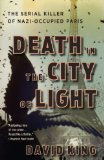Summary | Excerpt | Reviews | Beyond the Book | Readalikes | Genres & Themes | Author Bio

The Serial Killer of Nazi-Occupied Paris
by David King
Beginning on June 9, the French government itself fled the capital.
Heading south, first to Orléans and then to the châteaux of the Loire, the leaders retreated to Bordeaux. Five days after their flight, the first German motorcyclists reached Paris, rolling into the Place Voltaire from the northern suburbs of Saint-Denis. By the early afternoon, the Nazi Wehrmacht had staged the first of its daily marches goose-stepping to drum and fife down an otherwise silent Avenue des Champs-Élysées. "There never has been anything like the eerie atmosphere in Paris," Robert Murphy observed from his office at the United States Embassy on the Place de la Concorde.
At least sixteen people in Paris took their own lives that day. The
neurosurgeon and head of the American Hospital, Comte Thierry de
Martel, stuck his arm with a syringe filled with strychnine. Novelist
Ernst Weiss, Franz Kafka's friend, swallowed a large amount of barbiturates, but when this overdose failed to have its intended effect, he slashed his wrists, dying twenty-four hours later. The sixty-four-year-old concierge at the Pasteur Institute, Joseph Meister, shot himself in the head rather than obey the German invaders - he had been the first person cured of rabies by Louis Pasteur.
Many Parisians were in shock. What the German army under the
kaiser had failed to do in four years of vicious slaughter in the First
World War had been accomplished under Adolf Hitler in six weeks.
France had suffered the most humiliating defeat in its history. Worse,
however, was to come.
THE Germans would occupy three-fifths of the country, seizing a
vast swath of territory north of the Loire that included two-thirds
of France's population, two-thirds of its most fertile agricultural lands, and three-fourths of its industry. The occupying power would control not only Paris but also the strategic Atlantic and Channel coastlines. France would have to pay the costs of the German Occupation, which were set at an exorbitant daily rate of 400 million francs and pegged to an inflated 20-1 franc-mark exchange rate. Over the next four years, France would pay the Third Reich a total of 631,866,000,000 francs, or almost 60 percent of its national income.
The rest of France was to be carved up. Germany seized Alsace
and Lorraine, as well as the northeastern territories of the Nord and
Pas-de-Calais, the latter governed by Wehrmacht Command in Brussels,
with entrance strictly forbidden to Frenchmen. A slice of territory
from Menton to the southeastern border was handed over to Germany's
ally, Italy. The remaining part, located south of the Loire, became the
"free" or the unoccupied zone, a nominally independent state with its capital in Vichy, a spa and casino resort known for its mineral water. When the French government had resettled there in the summer of 1940, it had to acknowledge "the rights of the occupying power."
Collaboration - once a benign word for "working together" - soon took on a sinister new meaning.
In Paris, the Blitzkrieg was rapidly followed by a Ritzkrieg. Nazi
officials arrived en masse to take control of the capital and commandeer
prime real estate in the elegant western districts. The High Command
of the German Military Occupation, which would govern the occupied
zone, moved into the Hôtel Majestic on avenue Kléber. The Kommandant, or governor-general, of Grand-Paris, chose the Hôtel Meurice on rue de Rivoli; the military intelligence and counterespionage organization, the Abwehr (Abwehrstelle Frankreichs), set up headquarters in the Hôtel Lutétia nearby on the Boulevard Raspail. The Luftwaffe took over the Palais Luxembourg, while the Kriegsmarine settled into various properties on and around the Place de la Concorde.
For Nazi officers and their favored French collaborators, Paris
had become the Babylon of the Third Reich. There were lavish
champagne-and-caviar parties hosted by Ambassador Otto Abetz on
rue de Lille, and equally extravagant affairs organized by Luftwaffe
General Friedrich-Carl Hanesse in the Rothschild mansion on Avenue
de Marigny. Famous restaurants, like Maxim's, Lapérouse, and La Tour d'Argent, catered to every whim, as did cabarets, nightclubs, and brothels, many of which enjoyed exemptions from the official curfew. As New York Times correspondent Kathleen Cannell put it, at the time of the discovered bodies on rue Le Sueur in March 1944 Nazi-occupied Paris seemed to be "dancing with false gaiety on a rumbling volcano."
Excerpted from Death in the City of Light by David King. Copyright © 2011 by David King. Excerpted by permission of Crown. All rights reserved. No part of this excerpt may be reproduced or reprinted without permission in writing from the publisher.




The worth of a book is to be measured by what you can carry away from it.
Click Here to find out who said this, as well as discovering other famous literary quotes!
Your guide toexceptional books
BookBrowse seeks out and recommends the best in contemporary fiction and nonfiction—books that not only engage and entertain but also deepen our understanding of ourselves and the world around us.